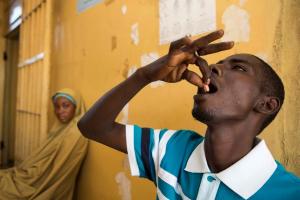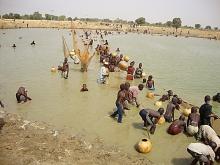WHO redoubles efforts to ‘leave no one behind’ in treatment of Neglected Tropical Diseases
Abuja, 4 July 2018 - The World Health Organization (WHO) has significantly increased support to the Government of Nigeria towards elimination of five of the over 20 Neglected Tropical Diseases (NTDs) endemic in the country due to her tropical nature.
This is in support of the country’s NTD roadmap developed in 2012, which prioritizes three diseases for control, five for elimination and two for eradication.
WHO’s present support is focused on NTDs that are controllable through mass drug chemoprophylaxis and involves supporting the Government in identifying all Local Government Areas (LGAs) with high disease burden, providing donated drugs for mass drug administration (MDA) for all such LGAs and monitoring the effectiveness of MDA activities.
For schistosomiasis (commonly called Bilharzia), a parasitic disease caused by a worm which enters the skin from infected water and lays hard/sharp eggs that damages organs as they spread; WHO provided over 60 million tablets of Praziquantel in 2017 for the 583 LGAs mapped to have high prevalence for this disease.
“I am so happy that I now urinate without seeing any blood in my urine,” says Habu Garu, an internally displaced person (due to insurgency) in Borno state and a beneficiary of WHO intervention that distributed nearly 12 million tablets of Praziquantel (a drug used to treat Schistosomiasis, one of the highly debilitating NTDs) to over 5 million children in the Northeast.
“For nearly two years, I kept seeing blood in my urine and was extremely traumatized. My friends used to mock me about it, calling it ‘male periods.’ I am so glad it is all over now”, a visibly elated Habu narrated.
As at December 2017, Nigeria accounted for nearly 50% of the global burden of NTDs with over half of the Nigerian population at risk to at least one of these diseases. The country is similarly implementing mass drug administration campaigns for Lymphatic Filariasis (LF), Soil Transmitted Helminthiasis (STH), Onchocerciasis (Oncho) and Trachoma, endemic in between 119 to 583 LGAs across Nigeria.
The partnership curbing scourges
WHO is working with partners including UNICEF, the Carter Center, Sight Savers, Research Triangle International and Seventeen Plus Foundation among others. This partnership is supporting government towards safe water supply, education and disease awareness as well as building capacities for behaviour change and training health workers to recognize and report suspected cases.
Since the beginning of 2018, WHO has been complementing other partners by supporting implementation of MDAs in up to 90 LGAs for Schitosomiasis, 39 for STH and 37 for LF. This will enable the country have total of 546 LGAs with ongoing treatment for LF, 478 LGAs for Oncho, 390 LGAs for STH and 64 LGAs for Trachoma. “By December 2018, WHO would have made significant contribution towards the country’s efforts to have treatment through mass drug administration ongoing in all endemic LGAs”, Dr Wondimagegnehu Alemu, the WHO Country Representative said.
Recall that on the recommendation of the Global Drancunculosis Certification Commission, the Director- General of WHO declared Nigeria free of Guinea Worm Disease (GWD) and the country has since continued its Post Eradication Surveillance with no single case of GWD reported in the last 5 years.
Sensitization to debunk NTDs myths.
There still exist traditional myths attributing NTDs to witchcraft or punishment from God, hence, uptake of the freely provided medicines is suboptimal in some areas.
“As such, they do not seek medical assistance and continue to suffer severe disfigurement and disabilities. This impacts negatively on life expectancy, education and economic opportunities of affected individuals and the communities they live in”, Dr Alemu said.
These myths and misconceptions are more prevalent in the rural areas; as such, sensitization remains very important in such settings for fostering behavior change towards early health-seeking behaviour and improved uptake of drugs during MDA campaigns.
“The Federal Ministry of Health has strengthened collaboration with grassroots organizations in order to increase awareness and uptake of free drugs for those at risk or afflicted by any of these targeted NTDs’’, Dr Obiageli Nebe of FMOH revealed.
WHO will continue to provide technical and logistics support as well as commodities and drug donation for treatment of NTDs in Nigeria.
Kindly follow us on Social Media:




